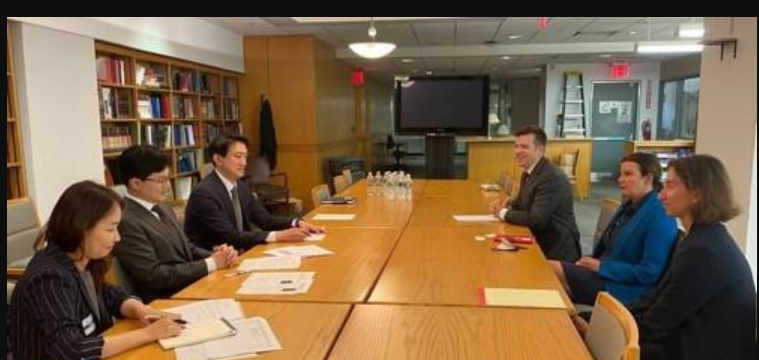South Korean Justice Minister Han Dong-hoon recently visited New York to discuss various ways in which the two countries might collaborate on investigations involving financial crimes, especially crypto-related crimes.
According to a local news publication, Hoon had a meeting with Securities and Commodities Task Force co-chief Andrea M. Griswold and Scott Hartman, chief of the Securities and Commodities Fraud Task Force at the United States Attorney’s Office for the Southern District of New York, on Tuesday.
The two parties discussed methods to exchange information and strengthen cooperation to combat the rising number of securities frauds in the digital asset market. The two sides have reportedly agreed to share their latest investigation data on Terra, a crypto project under investigation in both countries.

Justice Minister Han Dong-hoo (left) meets with prosecution officials from the United States, Source: Yna
The $40 billion Terra ecosystem crash has attracted legal scrutiny from both countries. The U.S has recently launched a new investigation into Terra co-founder Do Kwon, while South Korean authorities are investigating several charges including fraud, market manipulation and tax evasion.
The collaboration between the two countries could be the first of many, as crypto-related crimes have recently become the focus of regulators. South Korea has emerged as one of the most stringent countries in terms of cryptocurrency legislation, enforcing strict Know Your Customer (KYC) and Anti-Money Laundering (AML) guidelines.
The Terra scandal has also pushed Korean lawmakers to establish a new crypto oversight committee to assess the new crypto projects listed on crypto exchanges. Many analysts expected that the TerraUSD Classic (USTC) meltdown would prompt regulators to favour centralised stablecoins over algorithmic ones.
Tracking and prosecuting these crimes, which frequently involve cross-border transactions and laundering, is becoming increasingly difficult and complex due to a lack of clear crypto regulations. For example, a Dutch university paid 200,000 in Bitcoin (BTC) as a ransom in 2019. The investigators tracked one wallet to Ukraine and had to work with local officials to get back the funds nearly three years after the attack.
 coinculture.com
coinculture.com